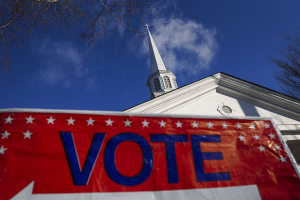A crippling hit to the porn industry?

Scripture makes clear that sexual immorality is an offense to God and harmful to those who engage in it. “Do you not know that the unrighteous will not inherit the kingdom of God?” asked Paul of the church in Corinth. “Do not be deceived: neither the sexually immoral, nor idolaters, nor adulterers, nor men who practice homosexuality, nor thieves, nor the greedy, nor drunkards, nor revilers, nor swindlers will inherit the Kingdom of God” (I Cor. 6:9-10).
That’s quite a list. The apostle covers a lot of sin’s ground, including sexual sin. He likens it to idolatry — the worship of a false god.
Pornography is a form of just that, devotion to a master that captivates and lies. It is also virtual adultery, or as someone once put it, “sex without persons.” But adultery is adultery: Jesus said that to look on a woman in lust is to violate her sexually; this is the very nature of pornography — sexual arousal through the gate of the eye (Mathew 5:28).
Not only is pornography sinful, it’s also dangerous. The National Center on Sexual Exploitation (NCOSE) has documented extensively the harmful effects of pornography. It distorts the way the brain functions, encourages prostitution and sex trafficking, and dehumanizes both participants and viewers. “Pornography contributes to the hypersexualization of teens and prepubescent children and may lead to low self-esteem, body image disorders, an increase in problematic sexual activity at younger ages, and increased desire among adolescents to engage in risky sexual behavior. Pornography may also impact brain development and functioning, contribute to emotional and medical illnesses, shape deviant sexual arousal, and lead to difficulty in forming or maintaining positive, intimate relationships, as well as promoting problematic or harmful sexual behaviors and addiction.”
Yet this last quote is not from NCOSE but a piece of legislation recently enacted in Louisiana. It was authored by freshman state legislator Laurie Schlegel, a certified sex addiction counselor who has witnessed firsthand the devastation caused by pornography. Her measure passed the Louisiana House 96-1 and 34-0 in the state senate and was signed by Democrat Governor John Bel Edwards, notorious for trying (thankfully, unsuccessfully) to veto a measure “banning puberty blockers, hormone therapy and elective surgery for minors.” In other words, so-called “transgender” procedures that include the mutilation of healthy teen bodies.
Schlegel’s bill “holds pornography websites liable unless the websites ‘perform reasonable age verification methods’ — in short, requiring users to show government ID to prove they are 18 or older.” Its argument is that pornography has created a public health crisis. It has adversely affected millions of young Americans whose still-forming brains and behavior patterns are misshapen by exposure to graphic and often perverse sexual acts. The result? “According to Ethical Capital Partners, the private equity company that owns Pornhub, (online pornography) traffic in Louisiana has dropped 80%.”
Louisiana is not alone. According to journalist Marc Novicoff, “In the other three states where the laws have been in effect for months — Utah, Mississippi, and Virginia — Pornhub did something even more unprecedented: It simply stopped operating.”
As might be expected, the pornography industry and its allies are litigating under the pretense of “free speech.” Yet given the indisputable and extensive evidence that pornography does horrible things to, especially, its younger viewers, it’s hard to argue that something as simple as proof-of-age-to-view is not needed.
Moreover, this isn’t about “free speech.” It’s about stopping the exploitation of the vulnerable, not allowing a corrupt and corrosive industry to captivate them when they are especially susceptible. It’s about preventing addiction to something that enslaves the brain and erodes the soul, not freedom.
It is a sad commentary on our culture that we need to use public health as a basis for limiting access to something so intrinsically debasing to those who bear God’s image. No married man and woman can deny that when one’s spouse draws sexual pleasure from someone else, whether through a physical encounter or from scenes on the internet, hurt and a sense of betrayal are natural responses. Nor can any honest person fail to admit that in the stillness of the God-given conscience — at least, until conscience’s voice is repeatedly silenced – there is profound moral unease about watching sexual acts and nudity online.
With that said, I’ll take the hard scientific data on pornography’s effects on physical, mental, and emotional well-being as a basis for keeping it away from young people. At the same time, I’ll also keep teaching my students that the beauty of sex is found only in a lifelong commitment to one’s partner in the covenant of one-man, one-woman marriage. That’s what our good Creator and Redeemer has declared. To argue to the contrary is, ultimately, to contend with Him.
Originally published at The Washington Stand.
Rob Schwarzwalder is Senior Lecturer in Regent University’s Honors College. Before coming to Regent University, Schwarzwalder was senior vice president at the Family Research Council for more than seven years, and previously served as chief of staff to two members of Congress. He was also a communications and media aide to a U.S. senator and senior speechwriter for the Hon. Tommy Thompson, secretary of the U.S. Department of Health and Human Services. For several years, he was director of Communications at the National Association of Manufacturers. While on Capitol Hill, Schwarzwalder served on the staffs of members of both Senate and House Armed Services Committees and the Senate Committee with oversight of federal health care policy. His writing has been carried in such diverse publications as the New York Times, U.S. News, Time Magazine, Christianity Today, the Public Interest, and the Federalist.




























